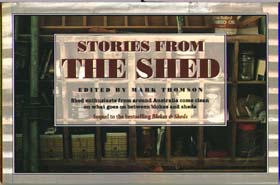| People are keen to talk about sheds. It strikes a nerve deep down. It's something we do with men, Australian men, and it runs across all classes, all ethnic backgrounds, the city and the country.
Some stories from the shed can be nostalgic and sentimental but there is more to this than simple invoking of some golden era in Australia's past. No-one is saying we should actually go back to the good old days; but there seems to be a need for saying where we come from, as a means of placing modern life in some sort of context.

Perhaps it's just the need to reattach oneself to some kind of certainty. Sheds seem to be a part of a collective memory and a trigger for finding a personal history that allows people to make sense of the past and deal with the future. There are many thousands of those little personal museums out there.
But it's not as simple as that either. To the politically correct, there's the strong whiff of male backlash against feminism about shed culture; some people feel that there's something wrong or weird here that needs a firm hand to get in there and correct it.
Backlash is too strong a word; if there is a backlash it's an uncertain and contradictory one for most part. Most men would agree if pushed that the impact of feminism has resulted in many positive changes. Yet there's simmering resentment about having been pigeonholed as the bad guy, the guilty party. Many men feel that nothing they can do or say is going to meet the approval of the morally superior and "them" in charge.
Meanwhile, the authority that was once handed to men as a birthright has been diluted and diffused. There's not so much certainty about the role of men anymore. Not that there were ever any easy guidebooks on how to be a man; paradoxes abound. There are still many expectations that men should be at least partly the tough guy, partly the sensitive tender type. A bit of Clint Eastwood mixed in with a touch of Deepak Chopra!
It's a bit of a tall order.
The shed becomes the place where you call off the bluff. You're just you. There are no Joneses to keep up with in the shed. Appearances are not kept up. The mask drops.
Even if life feels empty, the shed is not hollow – it can be richly packed, dense with things and stuff. It is materialistic without being consumerist. It can be an opportunity for a full-on assault of all senses: big stinks, loud noises, bad language, complete chaos and disorder.
There's a more subtle appeal to the senses, too. To run the hands along freshly sanded timber, stripped back to reveal hidden form and beauty. And then the varnish to give brilliant depth. Such beauty can be deeply and wordlessly appreciated. There is no need for words.
Some sheds are like a good piece of blues – soulful and dark, speaking about pain and loss, the contemplation of the failure of life's expectations, failure generally. Gritty, dirty, decaying and furtive. But these are not all negative: because like the blues, there can be the germ of repair and healing within. There is depth and substance.
Isolation is a recurring theme in sheds. This, too, is paradoxical. There are benefits from such isolation; contemplation and meditation in a calm place away from the hurly-burly of the world. A surprising number of men talk about sheds using words and images that show a strongly spiritual and religious aspect of shed ownership.
On the other hand sheds can be shells that men hide in, away from others, when they could benefit from contact with people.
Sheds often involve stories of fathers and grandfathesr. Of fathers, who may have seemed distant and inarticulate, perhaps even a touch tyrannical, but the passage of time has softened the memory and the more painful edges have been knocked off. To be taciturn and blunt was a sign of strength; verbal diarrhoea and the expression of emotion was weakness. Looking back on it all, most men acted as they understood to be the best. And it was in their sheds that they often found the strength to get through life.
Got a shed story to tell? Why not send in a thread? 
[From Stories from the Shed Edited by Mark Thomson, published November 1996 by HarperCollinsPublishers. Rrp:$14.95. Copyright c Mark Thomson. Reprinted with the permission of HarperCollinsPublishers.] |